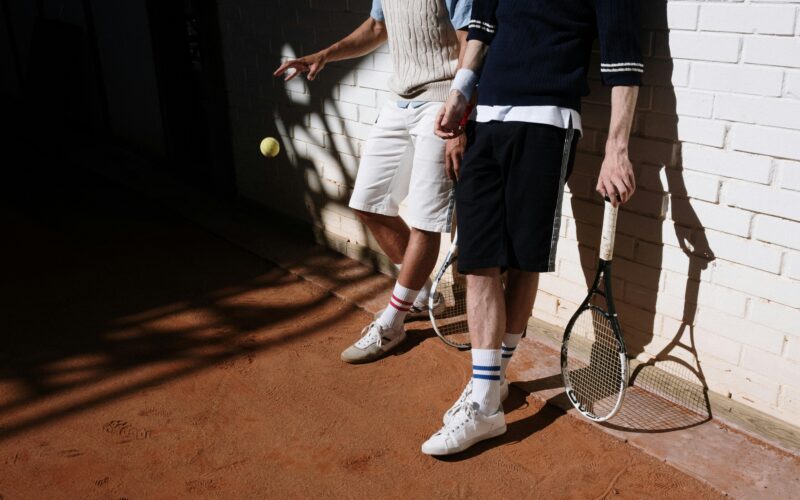In 2024, Olympic fashion has evolved beyond plain uniforms, and encapsulates performance, cultural diplomacy, and high-end branding. Louis Vuitton set the tone for the 2024 Paris Olympics by unveiling a custom-designed Olympic Torch Trunk for the event, bearing its signature brown checkboard canvas and blending its trademarked craftsmanship with the event’s traditional spirit.1[1]Alexandria Sillo, Olympic Triumph: Louis Vuitton Creates Bespoke Trunks for the 2024 Games, Galerie (July 26, 2024), https://galeriemagazine.com/louis-vuitton-olympic-medals-torch-trunks/. Louis Vuitton Moët Hennessy’s (LVMH) $160 million investment in Olympic-related ventures, including medals presented on custom-designed Louis Vuitton trays and Olympic volunteers dressed in Louis Vuitton uniforms, exemplifies this fusion of luxury and sports.2[2]Bisman Kaur & Radha Khera, Olympics 2024: When Fashion Brands Strike Gold, Asia IP (July 31, 2024), https://asiaiplaw.com/article/olympics-2024-when-fashion-brands-strike-gold. This unprecedented partnership marks LVMH as the first luxury brand to serve as an official sponsor of the Olympic Games themselves.3[3]Kaya Ginsky, LVMH Puts Mark on Olympics as Luxury Brands Embrace Sports, CNBC (August 11, 2024), https://www.cnbc.com/2024/08/11/lvmh-puts-mark-on-olympics-as-luxury-brands-embrace-sports.html
With millions of viewers tuning in globally, fashion brands are eager to affiliate themselves with the Olympics to capitalize on this worldwide exposure. However, this increased visibility carries risks, including complicated athletic endorsements, inevitable trademark infringement, and counterfeiting concerns. The question arises: What should fashion brands know before entering the competitive Olympic arena?
Rules of the Game: The Legal Protections of Olympic Trademarks
At the core of Olympic branding are stringent protections enforced by the International Olympic Committee (IOC) and the U.S. Olympic and Paralympic Committee (USOPC).4[2]Snapshot: Where Do Brands Stand When it Comes to Olympics Trademarks?, The Fashion Law, https://www.thefashionlaw.com/resource-center-snapshot-where-do-brands-stand-when-it-comes-to-olympics-trademarks/. Both organizations defend their trademarks vigorously, holding exclusive rights to terms like “Olympic,” “Paralympic,” and to the iconic interlocking rings logo.5[5]Id. The U.S. Patent and Trademark Office currently holds 154 registered Olympic trademarks.6[6]Fara Sunderji, How Brands Can Compete in the Games Without Being Official Sponsors, IPWatchdog (July 24, 2024), https://ipwatchdog.com/2024/07/24/brands-can-compete-games-without-official-sponsors/id=179327/.
The Ted Stevens Olympic and Amateur Sports Act, enacted in 1978, enhances this protection by allowing the USOPC to prevent unauthorized use of U.S. Olympic trademarks without the need to prove consumer confusion—otherwise an essential element for typical trademark holders7[7]Id.; Amateur Sports Act of 1978, Pub. L. No. 95-606, 92 Stat. 3045 (1978).. The reason is economic: the federal government provides no direct financial support to Team USA, so the sponsorship revenue is crucial,8[8]Id. and any unauthorized use of Olympic branding threatens this income stream.
Given the event’s global scale, Olympic legal complexities extend beyond borders. Intellectual property laws vary; civil law countries prioritize first-to-file trademark regimes, while common law countries prioritize first-to-use principles.9[9]Bisman Kaur & Radha Khera, Olympics 2024: When Fashion Brands Strike Gold, Asia IP (July 31, 2024), https://asiaiplaw.com/article/olympics-2024-when-fashion-brands-strike-gold Brands must understand these international differences to protect their interests effectively.
Moreover, the IOC relies on revenue from its own intellectual property to fund athletes and organize the Olympic Games, making trademark protection essential not just for legal reasons, but for the sustainability of the Olympic movement.10[10]Olympic Properties, International Olympic Committee, https://olympics.com/ioc/olympic-properties. The World Intellectual Property Organization (WIPO) and treaties like the 1981 Nairobi Treaty on the Protection of the Olympic Symbol reinforce global cooperation to safeguard these assets by mandating that member states invalidate unauthorized use of the Olympic rings.11[11]Summary of the Nairobi Treaty on the Protection of the Olympic Symbol (1981), World Intellectual Property Organization, https://www.wipo.int/treaties/en/ip/nairobi/summary_nairobi.html#:~:text=Olympic%20Symbol%20(1981)-,Summary%20of%20the%20Nairobi%20Treaty%20on%20the%20Protection%20of%20the,as%20a%20mark%2C%20etc.). By collaborating with WIPO and other entities, the IOC demonstrates its commitment to maintaining the value and integrity of the Olympic brand, ensuring that the benefits of this prestigious event can continue to support the sports community and uphold the Olympic spirit.
Understanding and adhering to these robust legal protections around Olympic trademarks are essential for fashion brands entering the Olympic arena. These protections safeguard the Olympic brand by creating a secure and regulated environment for official sponsors, reducing the risk of unauthorized use, legal disputes, and reputational harm. For brands that comply with these rules, the Olympics offer a valuable opportunity to gain global exposure by limiting challenges from unauthorized competition.
Counterfeiting Challenges in Olympic Fashion and How Brands Combat Them
The 2024 Olympics saw a significant surge in counterfeit goods, a recurring issue at major sporting events.12[12]Aaron West, At the Olympics, Advanced Counterfeiting Means Advanced Prevention, The Fashion Law (July 26, 2024), https://www.thefashionlaw.com/at-the-olympics-advanced-counterfeits-means-advanced-prevention/. With increased consumer excitement, influencer-driven marketing, and a flood of international tourists, counterfeiters exploited the heightened demand for Olympic-themed fashion.13[13]Id. This resulted in a proliferation of fake products, ranging from unauthorized Olympic logos to counterfeit luxury items, leading to financial losses and reputational damage for affected brands.14[14]Id.
Counterfeiting also raises serious ethical concerns, such as the possibility of poor labor practices and environmental issues.15[15]Id. Ahead of the 2024 Paris Olympics, the IOC trained over 20,000 law enforcement officials in counterfeit detection to combat this issue.16[16]IOC Puts Robust Anti-Counterfeiting Efforts in Place to Protect Consumers and Maintain Athlete Support Ahead of Paris 2024, International Olympic Committee (July 29, 2024), https://olympics.com/ioc/news/ioc-puts-robust-anti-counterfeiting-efforts-in-place-to-protect-consumers-and-maintain-athlete-support-ahead-of-paris-2024. Further, the French government implemented strict measures to curb counterfeit sales, issuing warnings at airports and imposing fines up to approximately $326,000 and three years of imprisonment for violations.17[17]Emily Kappers, Preetha Chakarabarti, & Suzanne Giammalva, Authorities Go for Gold on Fake Fashion Enforcement as Paris Olympics Begin, Crowell (July 26, 2024), https://www.retailconsumerproductslaw.com/2024/07/authorities-go-for-gold-on-fake-fashion-enforcement-as-paris-olympics-begin/. Raids on popular tourist sites, such as the Saint-Ouen flea market in Paris in April 2024, resulted in the confiscation of over 63,000 counterfeit products, including fake Louis Vuitton and Nike items.18[18]Helen Reid, Layli Foroudi, & Mimosa Spencer, In Olympics Push, France Ramps Up War on Fake Fashion, Reuters (July 9, 2024), https://www.reuters.com/world/europe/deja-vu-olympics-push-france-ramps-up-war-fakes-2024-07-09/. These actions underscored the commitment to protecting both designer brands and the Olympic brand, as well as protecting consumers.
Brands must be proactive to safeguard their products too. Registering trademarks and copyrights with customs authorities enables them to prevent counterfeit goods from entering key markets and from reaching consumers.19[19]Emily Kappers, Preetha Chakarabarti, & Suzanne Giammalva, Authorities Go for Gold on Fake Fashion Enforcement as Paris Olympics Begin, Crowell (July 26, 2024), https://www.retailconsumerproductslaw.com/2024/07/authorities-go-for-gold-on-fake-fashion-enforcement-as-paris-olympics-begin/. By promoting authorized retailers and providing consumers with guidance on identifying genuine products, brands can protect their integrity while ensuring that the Olympic spirit and the prestige of their labels remain untarnished.20[20]Id.
Navigating the Legal Complexities of Athlete Endorsements
The intersection of fashion and sports creates unique opportunities for brand partnerships through athlete endorsements. As Giorgio Armani once explained, “Sports will always be important in global culture, and so fashion … will always incorporate influences from sports.”21[21]Aaron Howes, Giorgio Armani Talks Streetwear, Youth Culture & His New Exhibition, Highsnobiety, https://www.highsnobiety.com/p/giorgio-armani-interview/. This synergy allows brands to sponsor Olympians, allowing them to gain brand visibility and tap into the cultural significance of sports as a powerful influence in the fashion industry. Notable collaborations, like Armani dressing Team Italy and Ralph Lauren styling Team USA, illustrate high fashion’s presence in the Olympic arena.22[22]Bisman Kaur & Radha Khera, Olympics 2024: When Fashion Brands Strike Gold, Asia IP (July 31, 2024), https://asiaiplaw.com/article/olympics-2024-when-fashion-brands-strike-gold. This potentially challenges traditional athletic brands like Adidas and Nike in sports fashion as luxury labels continue to embrace this arena. In today’s influencer-driven era, athletes have become trendsetters, enabling brands to tap into new consumer demographics and align with a growing athleisure market valued at over $350 billion.23[23]Id. This trend emphasizes the increasing significance of athlete endorsements in brand strategies, with projections suggesting that the sports sponsorship market will double by 2030 as companies seek to leverage the influence of athletes to enhance their visibility and consumer engagement.24[24]Id.
However, legal complexities arise in these partnerships. For instance, athletes affiliated with a brand could find themselves competing in events sponsored by rival brands, creating potential conflicts of interest. Addressing these intricacies requires careful planning to ensure compliance with contractual obligations and to safeguard reputational integrity, especially in exclusive agreements. Regulations like Rule 40 of the Olympic Charter further complicate this landscape by limiting athletes’ ability to promote non-official sponsors during a “blackout period” around the Olympic Games.25[25]Id. While designed to maintain the exclusivity of official sponsors, this regulation poses challenges for athletes and brands with existing endorsement deals. Violating Rule 40 can result in penalties for athletes, while brands risk losing partnerships with Olympians. To adapt, brands have developed creative content that highlights athletes’ journeys and training without directly marketing products, navigating the intersections of fashion, law, and sport.26[26]Id.
Fashion’s Olympic Victory: Legal Protections for the Win
Looking ahead, the Olympics will likely continue to push the boundaries of how fashion and sports intersect, fueled by innovations in digital marketing and growing demand for exclusive, high-quality sportswear. As sponsorship and consumer dynamics shift, brands that can navigate evolving legal challenges will remain poised to boost their profitability and to lead the way in shaping the future of fashion in the sports world.
As the fusion of fashion and sports continues to evolve, the Olympic Games provide a valuable platform for athletes and brands. From celebrity endorsements to the fierce protection of intellectual property, the legal landscape can be as competitive as the games, but luxury brands like LVMH are playing to win. For those daring enough to enter this arena, the rewards are as grand as the Olympic stage: global influence, brand loyalty, and a place on the podium of cultural relevance.
Article by: Sydney Wall
Sydney Wall is a 2026 J.D. Candidate at Brooklyn Law School




